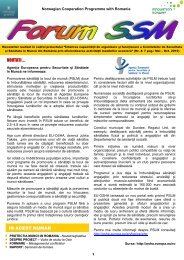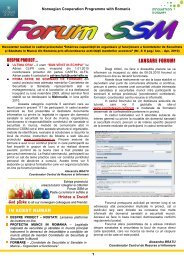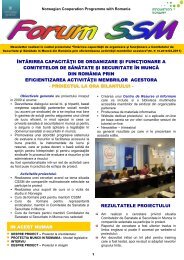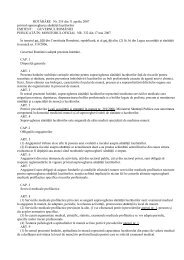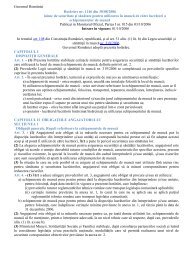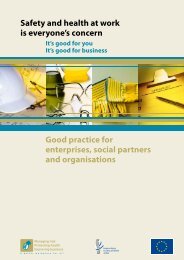Preventing work-related musculoskeletal disorders - European ...
Preventing work-related musculoskeletal disorders - European ...
Preventing work-related musculoskeletal disorders - European ...
Create successful ePaper yourself
Turn your PDF publications into a flip-book with our unique Google optimized e-Paper software.
<strong>Preventing</strong> <strong>work</strong>-<strong>related</strong> <strong>musculoskeletal</strong> <strong>disorders</strong><br />
prevention or specific provisions for one type of trade in a particular<br />
sector of the economy with its own methods of organisation. Little<br />
value added would appear likely to be generated by a new<br />
regulation, and in any event it would be limited to a relatively<br />
restricted aspect of the problem; more than is the case with other<br />
risks, there is unfortunately no ‘miracle cure’, applicable in all sectors<br />
of the economy and in all companies; to be effective, a case-by-case<br />
approach is required. It is therefore difficult to imagine legislation<br />
which could tackle the whole of the problem. I do not therefore<br />
believe that it would be useful to adopt a new regulation to ensure<br />
the prevention of MSDs.<br />
Moreover, employers in Europe are responsible for health and safety<br />
in their companies. Consequently, if there is to be effective<br />
prevention of MSDs, a flexible, non-binding frame<strong>work</strong> is required<br />
which will allow companies to choose from among different options<br />
those that are the most relevant and innovative; a rigid regulatory<br />
approach would not permit this.<br />
The most important thing is how those involved at the heart of<br />
companies respond: in other words, if there are complaints of<br />
intermittent pain this must be seen as an initial warning which<br />
should lead to an analysis of the situation and the institution of<br />
corrective measures where necessary. At the same time, the<br />
prevention of MSDs must be taken into account as an integral part<br />
of the process from the moment new <strong>work</strong>stations or equipment are<br />
to be designed or existing ones modified. It is thus essential that<br />
employers, those involved in prevention, and all members of staff<br />
are sufficiently trained and have sufficient information at their<br />
disposal to participate in such a process.<br />
OTHER INITIATIVES<br />
It should be stressed that we have some very useful information at<br />
our disposal, collected by the <strong>European</strong> Agency in Bilbao, including<br />
in particular the report by Professor Buckle. I do not believe in a<br />
Community tool for evaluating and overcoming the risks which exist<br />
in all companies. However, the drafting of guidelines containing a<br />
series of recommendations to be differentiated by sector and<br />
company, could be of considerable benefit. Moreover, greater<br />
training and more information for those affected could boost<br />
awareness of the problem, particularly among small and mediumsized<br />
enterprises. The organisation of a <strong>European</strong> seminar devoted<br />
to the subject would be a first step.<br />
The prevention of MSDs requires measures to be taken on the<br />
ground, often specific to the economic activity concerned. I believe<br />
that the Commission could do more to promote exchanges of<br />
experience by encouraging a dynamic, sectoral approach.<br />
My role as Chair of the ad hoc <strong>work</strong>ing party on MSDs of the<br />
Advisory Committee on Safety, Hygiene and Health Protection at<br />
Work will be to seek a consensual and pragmatic position for the<br />
<strong>work</strong>ing party, on which the Advisory Committee can base its<br />
opinion; on this basis, the Commission will be able to define the best<br />
approach to the effective prevention of MSDs at <strong>European</strong> level.<br />
* Patrick Levy is medical advisor to the RHODIA group (a world<br />
leader in speciality chemicals) and advisor to MEDEF (France) on<br />
health and safety at <strong>work</strong>. He chairs the ad hoc <strong>work</strong>ing party on<br />
<strong>musculoskeletal</strong> <strong>disorders</strong> of the Advisory Committee on Safety,<br />
Hygiene and Health Protection at Work.<br />
THEONI KOUKOULAKI*<br />
<strong>European</strong> Trade Union Technical Bureau on Safety and Health<br />
t he employees’<br />
viewpoint<br />
MSDs are a major occupational health problem in<br />
Europe creating a consequent social and economic<br />
burden. The Eurostat study launched by the<br />
Commission to achieve comparability of data on<br />
recognised occupational diseases in Member States in 1995 (EODS)<br />
indicates that MSDs were among the 10 more frequent diseases in<br />
the EU.<br />
Specifically Upper Limb Disorder cases were in 6th and 7th position.<br />
The very recent third <strong>European</strong> Survey on Working Conditions<br />
(2000) -in press- has revealed that 33% of <strong>European</strong> <strong>work</strong>ers have<br />
backache complaints and 23% neck and shoulder pains, 13% upper<br />
limb pains and 12% lower limb pains. These results present a sharp<br />
increase in the self-reported complaints comparing to the statistics<br />
of the second <strong>European</strong> survey of 1997. In addition, there is a<br />
significant increase in risks exposure (e.g. the percentage of part<br />
time <strong>work</strong>ers carrying heavy loads has increased by 4%;<br />
<strong>European</strong> Agency for Safety and Health at Work<br />
intensification of <strong>work</strong> - 15% <strong>work</strong>ers have <strong>work</strong> cycles of less than<br />
5 seconds).<br />
The problem of MSDs is now visible even though underreported in<br />
the Member States. What we are facing here is the tip of the iceberg<br />
of an epidemic.<br />
<strong>European</strong> employees expect <strong>European</strong> Union Institutions and<br />
Members States’ authorities to draw the necessary attention to<br />
MSDs and take political action. MSDs should be tackled by<br />
prevention through risk control in the <strong>work</strong>ing environment and<br />
early diagnosis, rehabilitation and compensation for those affected.<br />
Above all, our prime expectation from <strong>European</strong> Union institutions<br />
is to achieve an equivalent level of protection from the different<br />
types of MSDs for all <strong>European</strong> <strong>work</strong>ers. Improvement of the current<br />
legislation in order to provide sufficient prevention for all the types<br />
of MSD is required.<br />
Secondly those <strong>disorders</strong><br />
should be included in the<br />
national schedules of<br />
occupational diseases in<br />
order to be able to get<br />
compensation and to give<br />
accurate data on the MSD<br />
situation in the <strong>European</strong><br />
Union. Thirdly CEN should<br />
develop without any delays<br />
ergonomic standards in<br />
order to improve <strong>work</strong><br />
equipment design.<br />
Our prime expectation from<br />
<strong>European</strong> Union<br />
institutions is to achieve an<br />
equal level of protection<br />
from MSDs for all<br />
<strong>European</strong> <strong>work</strong>ers<br />
21



